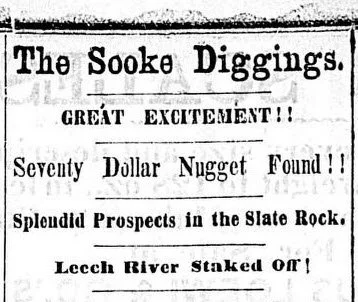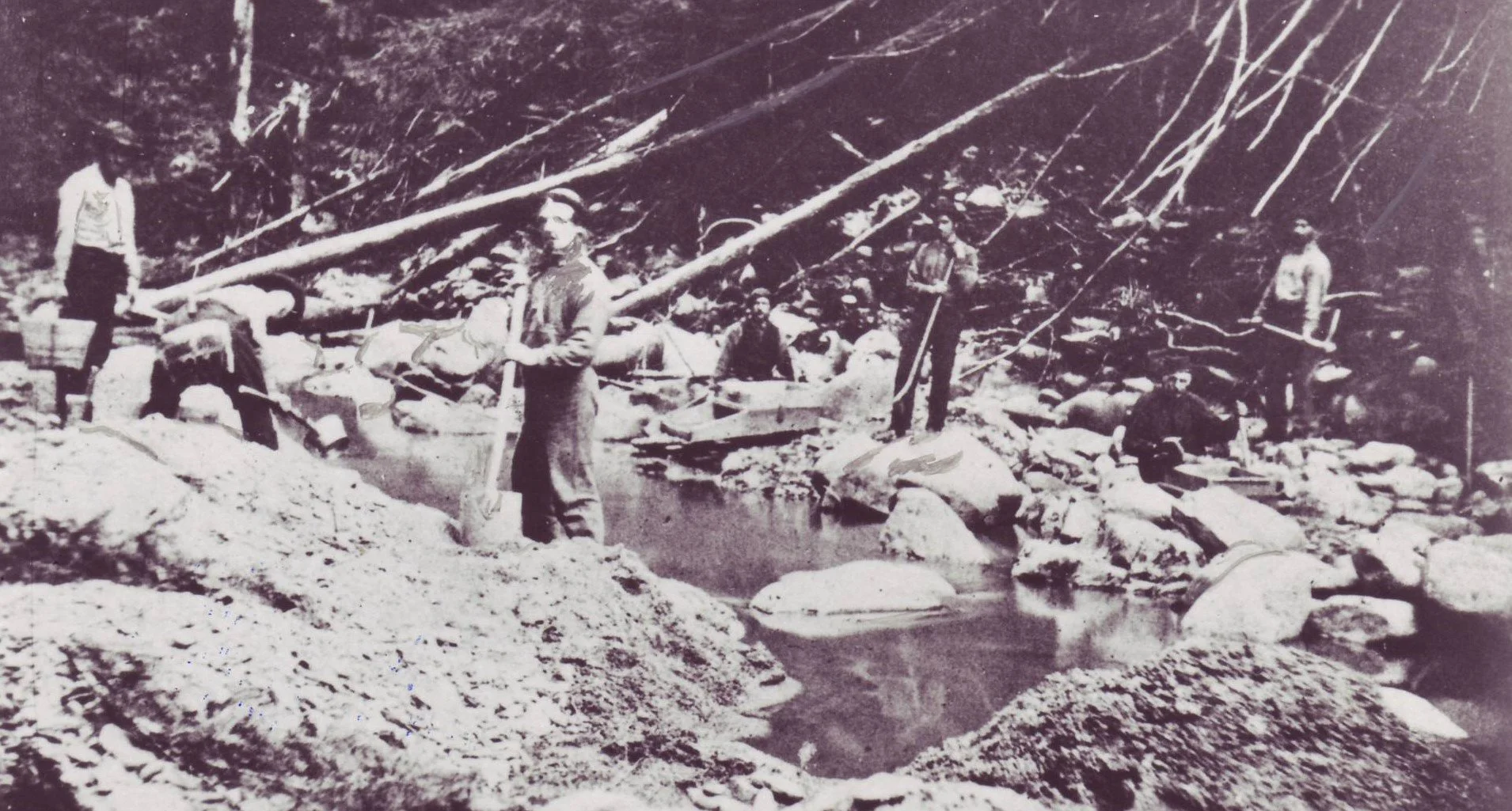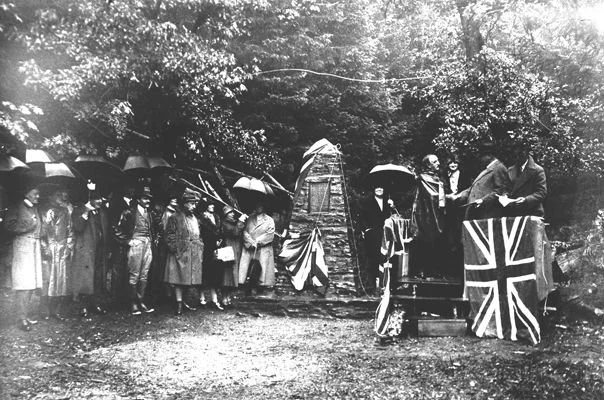Ho! for the Leech River
Headlines in the British Colonist, Aug. 4, 1864
Gold!
There’s no other word in the English language quite like it.
We of the nuclear and digital age can’t really grasp the full depth and meaning of the word that once held humankind in its thrall. That’s because we take it for granted that most men and women, at least those of us in the western world, are for the most part the masters of our own destinies.
The world is our oyster, right?
To have the profession of our choice we can go to university; to advance in our careers, we can work hard on the job and study on the side. In short, retirement on a reasonably comfortable pension is within the reach of many, probably most of us who are blessed to live in the western hemisphere. Much of it comes down to self initiative.
But this wasn’t the case at all, 160 years and more ago.
Most people back then were poor and few were educated; those who weren’t born with a silver spoon in their mouth could expect to work until they died. There was no social safety net, no government pension scheme—not even the remote chance of winning a lottery ticket!
Short of marrying into wealth or turning to crime you were doomed to a lifetime of hard, menial and mostly physical work.
Should we wonder then that the cry of ‘Gold!’—even from half a world away—fired the imaginations of the farmhand, the labourer and the poor?
Gold rushes in the 19th century offered the one and only chance for the ordinary citizen and the downtrodden to strike it rich. So it was, in July 1864, when it was announced that gold had been found in the Sooke and Cowichan rivers.
At that time, there were already 1000’s of would-be miners in British Columbia; men and women who’d arrived too late to stake rich claims on the Fraser River or in the Cariboo. They had the choice of working for whose who had struck it rich, working the land as settlers—literally from scratch—or going home in abject defeat with no real prospects of a second chance.
* * * * *
Vancouver Island has known only one real gold rush.
Oh, there were moments of excitement over the years, but nothing like what occurred on the B.C. Mainland: the Fraser and Thompson Rivers, the Cariboo, the Omineca, Big Bend, Atlin and the like.
Placer mining on the Leech River didn’t come easily—look at all those rocks. Most of the gold that was recovered was found in deep fissures in the creek bed and banks. —B.C. Provincial Archives
No, Vancouver Island has had to settle, for the most part, for copper and coal mining. The major exception was the Leech River stampede of 1864. It didn’t last long but it sure got people’s blood pumping for a time.
While it lasted, the Leech River excitement really was what we’ve seen in movies and read about in books—a stampede.
* * * * *
It began with the discovery of “colour”—gold dust and nuggets—by members of the government sponsored and publicly subscribed Vancouver Island Exploring Expedition. But it was the reports in the Victoria British Colonist that really lit the fuse.
The Leech River, a tributary of the Sooke River. You can see the areas that have been logged in recent years.—crd.bc.ca
“The quiet which has reigned in this community during the last three months was completely dispelled yesterday, and the whole city thrown into a state of excitement by the announcement of extensive surface diggings by the Exploration party on the Sooke and Leech rivers. The intelligence is contained in the following letter, addressed to the Exploration committee, by Dr. Brown, the commander which will undoubtedly be pursued with the liveliest interest.
The Committee met yesterday afternoon at Messers. Franklin's office, and heard the statements of Mr. Foley, one of the party, a miner of considerable experience, who had just returned, and he confirmed the details furnished by Dr. Brown. Mr. Foley had with him specimens of gold washed out.
He represents that during the first four miles of their ascent of the Sooke River, they prospected and found indications of gold, but nothing to pay; but then up to the junction of a tributary, flowing in from the westward, which they named Leech River, after Lieut. Leech, they found good $5 diggings. Some of the prospecting party being so high as 25 cents to the pan. The party, consisting of Messrs. Buttle, Foley, Whymper and McDonald, ascended Leech River, a distance of eight miles, when they reached the Forks of another stream, which they did not explore.
On the banks and bars along Leech River the excellent prospects alluded to in Dr. Brown's letter were obtained. The pay-dirt, which it is believed will be found to yield a “bit” to the pan, is said to be five feet deep, and the diggings are supposed to be sufficient to give profitable employment to several thousand miners.
The Committee, with Corporal Buttle, waited on His Excellency the Governor in the afternoon and consulted with him as to the immediate appointment of a Gold Commissioner, to receive mining licenses and records of claims, and also as to the law to be laid down in the staking of claims. We understand that His Excellency will appoint a Commissioner forthwith.”
Dispatch No. 4, VI Exploring Expedition, Camp No. 4, Clem-clem-aluts Indian village, 27th July, 1864, THE V.I. EXPLORING EXPEDITION:-
Gentleman: - I have the honour to announce for your satisfaction the safe arrival of both of the detached parties which I sent from Sooke, across country, bringing intelligence the most satisfactory to me, and the results of which cannot fail to prove of the highest importance to the prosperity of the colony and the further up-building of the city of Victoria.
2. The formal reports of Lieutenant Leech I shall forward by the first opportunity after its completion, but the intelligence I have to communicate is of too important a nature to bear delay in forwarding to you, even for one hour.
Accordingly, I have resolved to dispatch a special messenger with this letter and the accompanying specimens, and after mature deliberation I have selected Corporal Buttle, R.E., as one on whose fidelity and prudence I can place the most implicit reliance. This will necessitate a delay of about three days, but this was rendered necessary at all events to recruit the party after their fatigue, and Mr. Leech, having severely burned his foot, it will be fully that time before he's able to take the field.
To-day I will remove to a convenient place near the Quamichan Indian village, on the Nanaimo Trail where wood and water is convenient and salmon are caught on the River weir.
3. The discovery which I have to communicate is the finding of gold on the banks of one of the Forks of the Sooke River, about 12 miles from the sea in a straight line, and in a locality never hitherto reached by white men, in all probability never even by natives. I forward an eighth of an ounce, or thereabouts, of the course scale gold, washed out of 12 pans of dirt, and with no tools but a shovel and a gold pan.
The lowest prospect obtained is 3 cents to the pan, the highest $1 to the pan, and work like that with the rocker would yield what pay you can better calculate than I can, and the development of which, with what results to the Colony you can imagine.
The diggings extend for fully 25 miles, and would give employment to more than 4,000 men. Many of the claims would take 8 to 10 men men to work them. The diggings could be wrought with great facility by fluming the bed of the stream. The banks and benches can be sluiced or rocked. The timber on the banks will supply to the whipsaw all the timber that can ever be required for the miners’ purposes.
The country abounds with game and the ‘honest miner’ never need fear that he can find food enough without much trouble. A saw mill could be erected at the head waters (or say at the Forks of ‘Leech’s River’), and lumber for flumes, pumps, sluices &c., floated down to the miners, and on the whole the value of the diggings cannot be easily overestimated.
I may add, that there is any amount of ‘five cent dirt,’ and with proper tools the average prospect is about one bit [to] the pan. The gold will speak for itself.
Corporal Buttle will return to Camp No. 4 immediately, and I trust that you will deal liberally with the men when the diggings employ the number of people they are calculated to support, and that the Expedition will not be forgot in the Governor's Proclamation anent the discovery of gold-fields.
I announce this event with the most lively satisfaction, and trust that our labours are meeting with the approval of the colony. I will communicate the discovery at greater length, as soon as possible. Lieut. Leech sent a letter to me with an Indian, and I have no doubt but that you have received [it] before this. It announces the discovery, and encloses a small prospect of gold taken further down the river.
I have the honour to be, Gentlemen,
Your obedient servant,
Robt. Brown
Commander and Government Agent of the Expedition.
Further assay samplings averaged three and a-half cents to the pan. At first glance this looks to be insignificant but, when allowing for more than a century and a-half of inflation, it works about to be about $19 to the pan at 2023 values. Good wages then—and now!
Now, do you understand the significance of a gold rush to people 160 years ago?
Coincidentally, things had picked up in the Cariboo, too, the Colonist reporting “the most gratifying news” of new diggings: Placer Diggings Discovered Yielding From 5 Cents to $2 to the Pan.
But so much for the distant Cariboo, even the Fraser River diggings. For the first time the real promise of riches at hand, was much, much closer to home—as near as the Sooke and Leech rivers!
* * * * *
The B.C. Historical Society unveils a cairn commemorating the Leech River gold rush at the site of the gold commissioner’s cabin, Leechtown, Oct. 1, 1928. Only this cairn shows at the site today. —Image NA-40363, Courtesy of Royal B.C. Museum, B.C. Archives.
As is pointed out in a 1929 issue of the B.C. Historical Association (today’s B.C.Historical Federation), the name Leechtown is a misnomer:
“John Foley was the true discoverer of gold on both the Sooke and Leech Rivers, not Peter Leech. Although (with the absence of Brown) Leech was temporarily in command of the expedition, in both occasions Leech wasn’t even present at the time of the discoveries and he had put Foley in charge of the Leech River exploration.”
Foleytown?
(To be continued)
* * * * *
For some interesting videos of what you can see of historic Leechtown today, check out the Gold Nugget Adventures website: https://goldnuggetadventures.com/span




